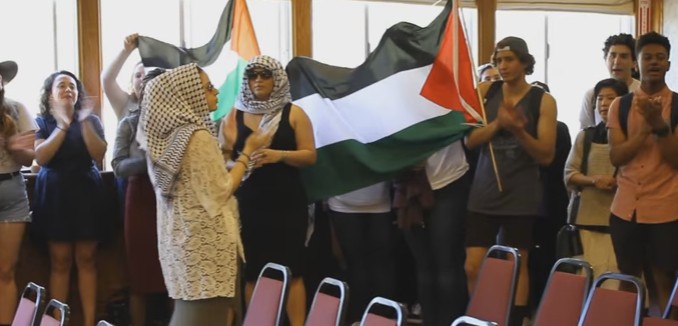Anti-Semitic incidents on U.S. university campuses increased by 45 percent in the first half of 2016 compared to the same period last year, according to a study (.pdf) released by a watchdog group on Tuesday.
The study, carried out by the AMCHA Initiative, focused on more than 100 American campuses with large Jewish populations. It found a strong correlation between anti-Israel activism on campus, especially the support of the Boycott, Divestment, Sanctions (BDS) campaign against Israel, and the number of anti-Semitic incidents.
The study noted that 287 anti-Semitic incidents were reported in the first half of 2016 at the campuses studied, a 45 percent increase from the 198 incidents logged during the same period in 2015. The study also found that the number of incidents restricting the civil rights of Jewish students — including free speech, freedom of movement, and freedom of assembly — increased to 14 in 2016, up from eight in 2015.
Anti-Semitic incidents were twice as likely to occur on campuses that have BDS activity, eight times as likely on campuses with at least one active anti-Zionist group such as Students for Justice in Palestine (SJP), and six times as likely when the campus has one or more professors advocating for boycotts of Israel. (Jonathan Schanzer of the Foundation for Defense of Democracies testified before Congress in April that at least seven individuals employed by American Muslims for Palestine, a major supporter of SJP, previously worked for groups that fundraised for Hamas.)
These findings are consistent with AMCHA’s 2015 report on campus anti-Semitism, which found a strong correlation between anti-Israel activism on campus and anti-Semitism.
“Instead of just boycotting Israel, the anti-Zionists are now boycotting Jewish students,” Professor Leila Beckwith, a co-founder of AMCHA and one of the study’s lead researchers, said in a statement. “Sadly, all too often it is not debate but hate. The lines between political discussions on Israeli policy and discrimination toward Jewish students are being blurred. Anti-Zionists are attempting to harm, alienate, and ostracize Jewish students; it is Jewish students’ civil rights that are being trampled. To properly address this rise in anti-Jewish bigotry, universities must adopt a proper definition of contemporary anti-Semitism and use it to educate the campus community about the distinct line between criticism of Israeli policies and discrimination against Jewish people.”
One of the incidents mentioned in the study is the April 2016 protest by the General Union of Palestine Students at San Francisco State University, which shut down a scheduled speech by Jerusalem Mayor Nir Barkat. A video of that protest is embedded below.
The study also noted a March incident where black transsexual activist Janet Mock cancelled her speech at Brown University’s Hillel after protests by anti-Israel campaigners.
Following The Tower’s report on Joy Karega, a professor at Oberlin College whose Facebook posts blamed Israelis and Jews for the 9/11 attacks and other atrocities, Tablet Magazine explored the culture of anti-Semitic intimidation that has been an ongoing problem at the college. Tablet quoted a long-time Oberlin professor who observed that “students are targeted if they identify Jewishly in any way.” Among the tactics cited by the professor were the “totalitarian suppression” of speech through intimidation or walking away from students who identified as Jewish. The professor termed the behavior he saw as “personalizing persecution of those identified with a position or affiliation.”
In On Many Campuses Hate is Spelled SJP, which was published in the September 2014 issue of The Tower Magazine, Daniel Mael identified the tactics highlighted by AMCHA’s study and predicted that hostility against Jews on U.S. university campuses would worsen if administrators did not take a stronger stand against them.
Instead of promoting justice, SJP and/or its members spend almost all of their energy demonizing Israel, advocating for its eventual destruction, showing an unfortunate affinity for pro-terrorist figures, bullying and intimidating pro-Israel and Jewish students with vicious and sometimes anti-Semitic rhetoric, and even at times engaging in physical violence. While SJP may pay lip-service to peaceful aims, their rhetoric and actions make it hard to avoid the conclusion that a culture of hatred permeates nearly everything the group does—making the college experience increasingly uncomfortable, at times even dangerous, for Jewish or pro-Israel students. Perhaps equally disturbing is the limited response from university authorities that have an obligation to prevent such attacks and protect Jewish students.
And the risk to Jewish and pro-Israel students appears to be growing. Indeed, unless college administrators take a more active role in preventing it, SJP has a good chance of achieving its goal of turning venomous hatred of Israel and bullying of Jews and non-Jewish supporters—with all the violence and fear that inevitably accompany it—into a legitimate and accepted tactic on North American campuses.
[Photo: J. the Jewish News Weekly of Northern California / YouTube ]




